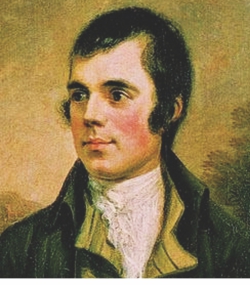Post Campus
Robert Burns:
Scottish Tunes in Bangla Gaan
Asrar Chowdhury
| |
 |
| |
Robert Burns |
Celebrating the life and works of poets is an Eastern tradition that has remained alive for centuries. These poets surpass the boundaries of their countries and regions of origins to become universal poets. Ferdowsi, Hafez, Sadi, Khayyam and Rumi are celebrated in Iran; Iqbal and Faiz in Pakistan; Darwish in Palestine; Gibran in Lebanon; and Qabbani in Syria. Bangladesh and Bengal celebrate Tagore, Nazrul, Lalon and many other greats. These celebrations are national events. Similar national celebrations are not widely observed in the West. There are noble exceptions, though. When the genius of a poet is such that his works personifies his nation like the Great Poets of the East, the West also celebrates their poets. One such poet is Robert Burns (Jan 25, 1759 – Jul 21, 1796), the Bard- the Celtic Minstrel Poet- of Scotland.
From the beginning of time, Scotts have had tribal rivalries between regions and religious sects. In modern times, this rivalry is expressed on the field in sports through football and rugby. When January 25 comes each year, Scotts forget their differences. An entire nation becomes one on Burns Night. Everybody will 'take a cup of kindness' for their Bard, Robert Burns. The legacy of Burns Night is such that it easily surpasses the official National Day of Scotland- St Andrew's Day. The genius of Robert Burns is such that his legacy spreads from his native Scotland to Bangladesh and the Bangla speaking world- and the whole world. Robert Burns is unquestionably Scotland's greatest historical export to the world.
Robert Burns was born in South Ayrshire in Western Scotland. His father, William, was a self-educated farmer. Burns and his brothers and sisters received little or no formal education. Their Father, William, would teach them after work. In spite of their poverty, William ensured that his children were taught by a Tutor. Working on the farm had a lasting impression in the heart and mind of young Rabbie (Robert). It exposed him to the heart and soul of Scotland. This upbringing made it evident poetry would guide Rabbie and with it would guide Scotland and the world. Burns wrote in the Old Scots language and also in English. However, it was not in his prose or in his poetry that his legacy lives. It is in the songs of ancient tunes of the Celtic Nations that has kept Rabbie a darling of the world.
Following on his success in critical circles, Robert Burns started to collect and preserve Scottish folk songs. Scottish folk songs are based on ancient Celtic tunes of the tribes of Scotland and Ireland in particular. Many of these compositions are pentatonic- using only five notes in an octave. Even more surprising, many Celtic tunes have the same pentatonic form as Raga Bhoopali of Hindustani Classical Music (Sa-Re-Ga-Pa-Dha). Collecting old folk tunes, adapting and changing them to suit the mood is not unique to Burns. In Bangla Gaan, Tagore did the same with the Baul songs of Kushtia. Sachin Korta and his Jhuli of Bangla Gaan were the tunes he collected from the Majhi Mallahs of his childhood Comilla. Probably the greatest composer of Bangla Gaan, Nazrul did the same as he heard anything and everything and took Bangla Gaan to new heights in the 1930s. The result of all these fusions was magic. Bangla Gaan became richer.
| |
 |
| |
Rabindranath Tagore |
The greatest Bangla poet, Rabindranath Tagore, was deeply influenced by Celtic Tunes, especially the tunes of the Scott, Robert Burns and the Irish, Thomas Moore (1780-1852). Tagore's Scottish (Celtic) links did not come from emptiness. His Grandfather, Prince Dwarkanath Tagore, was honoured with the Freedom of the City Award by Edinburgh Council in 1845. Although Burns and Tagore never met, Burns' immortal pentatonic tunes influenced Tagore. Purano Shei Diner Kotha is based on Robert Burns' most popular tune Auld Lang Syne- the tune that is sung on Burns Night and throughout the world on New Year's Eve. In 1882 Tagore just changed the tempo of Burns' composition of Auld Lang Syne, which Burns himself took from Can Ye Labour Lea. In 1881, Tagore took Burns' Ye Banks and Brae and introduced it verbatim to Bangla Gaan as Phoole Phoole Dhole Dhole. Tagore's Celtic influence can also be seen in his 1888 adaptation of Go Where Glory Waits Thee by the Irish Poet, Thomas Moore in the song from the musical drama, Mayar Khela, Aha Aji E Boshonte.
The Burns influence in Bangla Gaan was not confined to Rabindranath Tagore. In modern times, almost a century after Tagore, Suparnakanti Ghosh injected the tune of Auld Lang Syne verbatim at the beginning of Gouriprasanna Majumder's lyrics of Coffee House-er Shei Addata in 1983. The main song remains an adaptation of Auld Lang Syne. The rest was left for Manna Dey to make the song an anthem of the youth for generations to come and go.
The Poet John Stuart Blackie (1809-1895) summed it up, “When Scotland forgets Burns then history will forget Scotland”. This is not an understatement. Alongside Adam Smith and David Hume, Robert Burns remains the third pillar from Scotland who laid the foundations of the British Enlightenment of the 18th and 19th Centuries. Burns' Auld Lang Syne (Old Long Since) remains one of the most influential and well loved tunes in human history, ranking Burns alongside the Great Poets of the East, whose songs and lyrics are still revered in the hearts of men and the men of hearts, centuries later. On January 25 this year, let us all 'take a cup of kindness' for Auld Lang Syne and express our indebtedness to Robert Burns and his influence on Bangla Gaan.
(The author teaches economic theory at Jahangirnagar University and North South University)
|
|
|
